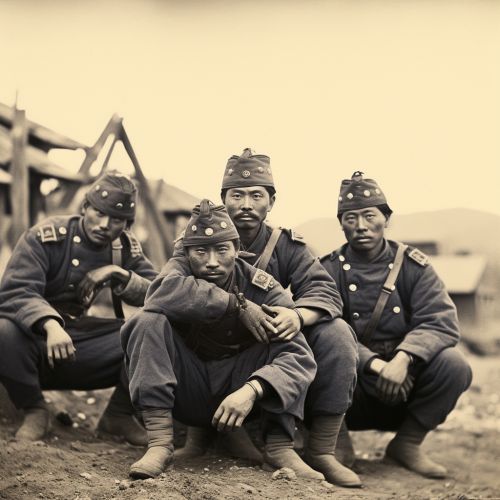Russo-Japanese War
Background
The Russo-Japanese War was a military conflict fought between the Russian Empire and the Empire of Japan from 1904 to 1905. The war was primarily fought over rival imperial ambitions in Manchuria and Korea, with the Japanese seeking to prevent Russian encroachment in the region.


Causes of the War
The main cause of the Russo-Japanese War was the imperialistic ambitions of both Russia and Japan in East Asia. The Russian Empire, seeking a warm-water port on the Pacific Ocean for their navy as well as for maritime trade, had forced China to lease them Port Arthur (now Dalian) and the strategically important Liaodong Peninsula after the First Sino-Japanese War in 1895. Japan, on the other hand, sought to control Korea and Manchuria as part of its policy of creating a "buffer zone" against potential Russian expansion.
Course of the War
The war began on February 8, 1904, when the Japanese launched a surprise attack on the Russian Eastern Fleet at Port Arthur. The Battle of Port Arthur marked the beginning of the war, with the Japanese navy blockading the port and launching a series of attacks on the Russian fleet.
In the following months, the Japanese forces launched a series of successful attacks against the Russian forces in Manchuria. The Battle of Mukden, fought from February to March 1905, was the largest land battle of the war and ended in a decisive Japanese victory.
Naval warfare played a crucial role in the Russo-Japanese War. The Battle of Tsushima, fought in May 1905, was the most decisive naval battle of the war. The Japanese fleet, under the command of Admiral Heihachiro Togo, destroyed two-thirds of the Russian fleet in a single day. This victory effectively ended Russia's naval presence in the East and was a significant factor in the subsequent peace negotiations.
Impact of the War
The Russo-Japanese War had significant implications for both Russia and Japan, as well as for the wider world. For Russia, the war exposed the weaknesses of the Tsarist regime and was a major factor in the outbreak of the Russian Revolution of 1905. For Japan, the victory established its status as a world power and marked its emergence as the dominant power in East Asia.
Treaty of Portsmouth
The war officially ended with the signing of the Treaty of Portsmouth on September 5, 1905. The treaty, mediated by U.S. President Theodore Roosevelt, recognized Japan's control over Korea and transferred Russia's lease of Port Arthur and the Liaodong Peninsula to Japan. The treaty was a significant diplomatic victory for Japan and marked the beginning of a new era in East Asian international relations.
